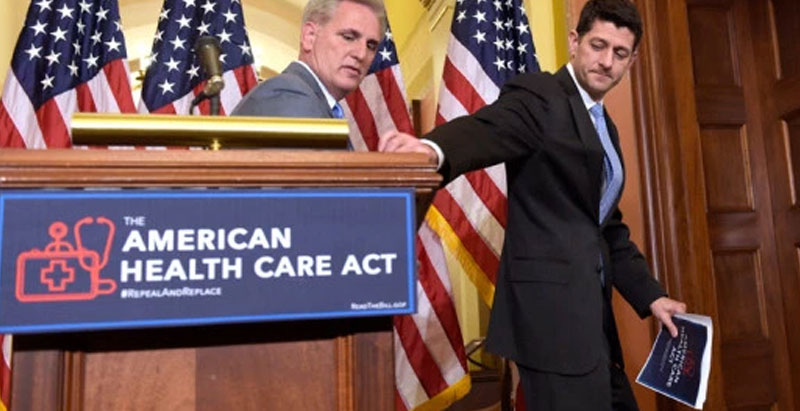Can Republicans change the equivalent of the law of gravity in Washington, D.C.?
Can they repeal an entitlement program partially upheld by the Supreme Court and make it permanently go away?
Recent rumblings this week on the Republican-led efforts to repeal and replace ObamaCare are not hopeful for those who care about lowering healthcare costs, reducing complexity, and lowering barriers to options.
Republicans repeatedly campaigned on their promise to repeal ObamaCare since its passage through the Democratic-controlled House of Representatives in 2009, and they won election after election based on this promise. Now that Republicans finally are in a position to repeal ObamaCare fully and permanently, they have run out of excuses to avoid full repeal.
Now that Republicans finally are in a position to repeal ObamaCare fully and permanently, they have run out of excuses to avoid full repeal.
Their latest proposal (oddly enough the Republicans are negotiating against themselves in the repeal effort) shifts decision-making to state governments and the Department of Health and Human Services.
In a move familiar to observers of the Democrats’ mangled attempts to make ObamaCare less unwieldy, the bill allows state governments to apply for waivers from current regulations including the essential health benefits and price controls manipulations for pre-existing conditions (known as the community rating regulations).
“States would have the option to jettison two major parts of the Affordable Care Act’s insurance regulations,” explains The New York Times. “They could decide to opt out of provisions that require insurers to cover a standard, minimum package of benefits, known as the essential health benefits. And they could decide to do away with a rule that requires insurance companies to charge the same price to everyone who is the same age, a provision called community rating.”
Shockingly, the Republican proposal would first, retain these regulations and push the live action and debate to the states to act on the provision to opt out, instead of cleanly fixing what the federal government broke in enacting ObamaCare as a one-size-fits all mandate from Washington, D.C., with waivers and exemptions for favored companies and the U.S. Congress, for example. Second, the proposal puts the power in the hands of the states instead of into the hands of individual Americans who know which health care choices are best for their families.
Certainly Republicans have made attractive proposals to change our dissatisfactory health care insurance system over the years of living under ObamaCare, including allowing insurance to be sold across state lines, utilizing powerful Health Savings Accounts, and revamping the High Risk Pools to help Americans who cannot afford necessary care.
When we charge healthy Americans more for their health care insurance than economically rational, we force these Americans to opt out of health insurance.
If we revised ObamaCare to allow differential pricing based on risk factors rather than mandating healthy people subsidize known sick people through graduated insurance premium pricing, we could offer support for our sick community members drawn out of our general federal expenditures paid for by tax revenue. Tax obligations are certain; health care insurance premiums are optional, as we have vividly discovered through the implementation experience of ObamaCare. Thus, people decline to purchase health insurance when it is priced out of line with its benefits.
The current flawed Republican proposal fails Americans who live in states where an ObamaCare opt out is highly unlikely. States with Democratic governors or Republican governors who accepted the Trojan horse of Medicaid expansion will continue to be left defenseless against the squeeze of rising premiums, skinny networks, inaccessibility of care, and mounting complexity.
Adding to the problem that not all Americans will be afforded the option promised to them by elected Republicans, even those Americans in states securing waivers from ObamaCare cannot rest easy. Waivers, under the architecture of this proposal, are not permanent.
A new administration can easily reverse the waivers by order of the Department of Health and Human Services. When a Democrat gains the office of the presidency again (which history suggests is likely), the new president can instruct the HHS appointee to sweep away the waivers to those states granted them under a Republican administration.
Republicans in Congress owe their fancy, prestigious offices in the halls of Congress to their unremitting and persuasive commitment to the voters to repeal ObamaCare and provide choice for all Americans.
This proposal does not yet provide the promised relief. Republicans in Congress owe their fancy, prestigious offices in the halls of Congress to their unremitting and persuasive commitment to the voters to repeal ObamaCare and provide choice for all Americans.
This latest half measure will not remove ObamaCare’s hazards and will not provide cover to Republicans hoping to retain control of Congress in the 2018 midterms.
First published in The Hill in April 2017








